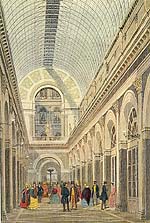Start - Welcome
- History
- Publications - Family Stories - Family Tree - Weblinks - Sitemap - Members Only
|
| Where they came from |
||
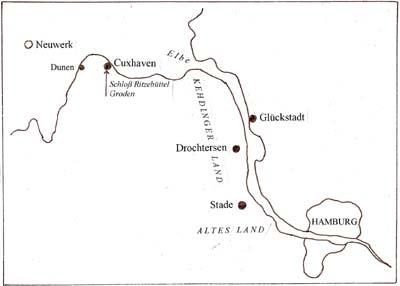 |
||
| more pictures | ||
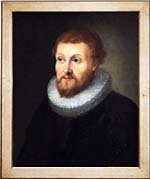 Ratsherr Jacob Selm |
The authentic story of
the Sillem
family begins in the XVIth century. The brothers Jacob
Selm
(1517-1584) (see
picture)
and Heyn
Sylm
(?-1565), coming from the Kehdingen area (50 miles downstream), crossed
the river Elbe and moved to the Free City of the Empire and
Hanseatic
City of Hamburg. There they established themselves as
successful
merchants. It is assumed that their ancestors had come from the Netherlands
to settle in the Kehdingen area in the XIVth or XVth century. At that time, it was quite common for
Dutch and Frisian farmers to dyke swampy marshlands south of the Elbe
to claim fertile farming ground. In village parish registers would
appear names such as Silm, Zelm and
Selm.
It is possible that the
family originally came from somewhere near Zelhem, a
little market town
in the east of the Netherlands first mentioned in the IXth century. Over
time, its name changed from Selhelm, Zeelen, Zelm, Zillem to
today's Zelhem.
|
|
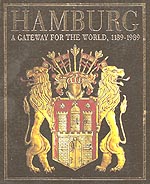 |
Deeply involved in the City of Hamburg Jacob and Heyn got
married to
ladies from established families of Ratsherren
(Council
members,
the Council being the government of the republican free city state).
And Jacob himself was appointed Councillor in 1560. His brother Heyn
however did not even live to become 50. He presumably died of the
Plague. As both had sons, up to these days they are considered the
founders of two branches of the Sillem family. Both branches produced important
personalities, among them 2 mayors, 9 councillors, 15 judges, 7 Kämmereibürger (in charge of the
finances), 11 Bancobürger
(in
charge
of the bank) and 14 Waisenhausbürger
(in
charge of the orphanages). A visitor to the City
Hall can admire portraits of councillors and mayors, and among the
stone coats of arms that adorn the magnificent facade, the Sillem coat
of arms can be seen. The sons and grandsons of Heyn Sylm were drapers and thereby
members
of the city's upper class. The majority of Jacob's
descendants became
long distance traders. There goods were shipped down to the Iberian
Peninsula and they were doing import and export business with their
partners in Flanders, the Netherlands, and England. One of Jacob's
grandsons had studied law in Basel (Basle) in Switzerland. He was the
first lawyer/barrister in the family, to be succeeded by about twenty
percent of all the descendants. Up to the 19th century members of both
branches of the family lived in Hamburg. Related by marriages and
generally close-knit, both branches carried the same family coat of
arms.
|
About Hamburg Views of Hamburg |
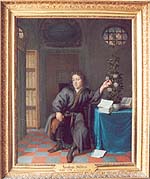 Nicolaus Sillem |
Troublemakers in the City At
the end of the XVII century, two influential merchants usurped the
government in the city republic. One of them was Hieronymus
Snitger (1648-1686)
who was married to Cäcilia
Sillem
(?-1681). After the governing mayor had fled the city many members of
the Bürgerschaft
(the
city parliament) joined the two rebels. They dismissed some of the
council members, appointed new ones and intended to govern happily ever
after. However, the deposed mayor managed to persuade the Duke of
Lüneburg and Celle to launch a counter attack. Troups were
deployed towards Hamburg. The
aim was to reinstate the former mayor
and
jail the two rebels. They in turn asked the King of Denmark whose
territory bordered on Hamburg to prevent the Lüneburg troups
from
invading. This was most welcome to him as it had been his intention for
quite some time to annex the city to his kingdom. When the citizens of
Hamburg heard about the deal they opened the gates to the
Lüneburg
people and threw the two merchants into jail. The revenge of the
reinstated mayor was to follow immediately: the two were tortured and
subsequently beheaded. Fortunately, Cäcilia had departed this
life
already five years earlier. The followers of the two had to face severe
punishment. Among them was the lawyer Nicolaus
Sillem (1649-1721).
He had
to pay 10,000 thalers and had to
leave the city with his wife and five children. But it is likely that
he led a comfortable life as a judge in the kingdom of Denmark
thereafter.
|
|
|
|
||
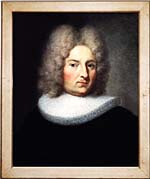 Ratsherr (Councillor) Hieronymus Sillem |
Expelled from the office The
unrest in the city continued. In its wake the merchant and ship owner
Hieronymus
Sillem (1648-1710) not only lost his lifetime membership
in the
Council but had to confront accusations by a court officer that his
wife had tried to poison one of her servants. However, the lady was
acquitted by the Lower Court and the informer was expelled from the
city with the bell of shame ringing. The reason why Hieronymus was
dismissed from his office was the following. In 1691, the Imperial
Embassy (of the Hapsburg Emperor residing in Vienna) had demanded the
imprisonment of a citizen named Rees. This was the duty of
the
Councillor Hieronymus Sillem, as he was the oldest of the court
officials. Friends of the citizen under arrest were furious and
demanded from the Council and the Oberalten (the
council of
parish Elders) his immediate release. They maintained that it was
against the constituton to arrest a citizen who was willing to pay
bail. The council reacted on the spot and sent the citizen Rees home.
Rees however was not satisfied. He submitted a plea to the Bürgerschaft (the
city
parliament) to dismiss Councillor Sillem. The Bürgerschaft agreed and demanded from
the
Council to comply. The Council rejected the motion on the ground that
Sillem had acted on their behalf. That he had answered the accusations
and shown the orders he had received from the Council. The citizens
then set up meetings in the parishes and had motions passed that
deposed the Councillor. The city government however did not accept the
votes, arguing that only they themselves were entitled to decide
on such a
matter.
In
another meeting the Council
was urged to name a
successor to Sillem as the parishes had dismissed him. The Council
refused again. As a consequence, the parishes elected a new councillor.
However he declared that he would accept the position only if the
Council appointed him, too. The Council refused again. Thereupon the Bürgerschaft declared that they would
freeze the
allowance granted the Council until they agreed. After some argument
the citizens left at 3 am without the matter having been settled. Now
the Emperor in Vienna through his ambassador got himself involved in
the
conflict. However the Council remained unmoved. Five weeks later it
called a session of the Bürgerschaft
and offered the
following: If the
citizens did not insist on Sillem's removal the Council would
appoint the citizen's candidate as Council member, too. The citizens
rejected the proposal. Their response: Either Sillem would be removed
from office or the following sanctions would be applied:
The Council still kept to his position of rejection. Thereupon the
citizens decided that the government was not allowed to leave the City
Hall before fulfilling the citizen's demands. The employees were sent
home and some of the citizens were appointed as guards in front of the
meeting hall. At 8 am next morning they went home without having
achieved their aims. The Council called another session of the Bürgerschaft
und
suggested that Sillem should stay on as Council member but loose his
office as a judge. The citizens rejected this proposal as well and
locked the doors again. Three hours later, Sillem was demoted and the
person elected by the citizens took his office.
12 years later a High Commission appointed by the Emperor prompted the
Council to reinstall Sillem in his honorary position. He was to take
over his seat in the Council again und also be reimbursed with the
salary of 6,000 Imperial thalers that had been withheld from him. He
was requested to appear in the City Hall on the 11th of March, 1709.
Two younger citizens, his son Garlieb and one Mr Rumpff, had the state
carriage directed to his house and picked him up rehabilitated.
|
|
| |
||
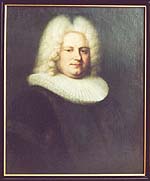 Mayor Garlieb Sillem 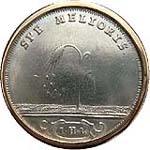 Commemorative coin for the Mayor 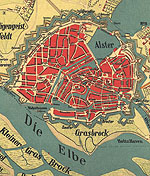 Hamburg 1750 Source: http://www.historic-maps.de/ |
Garlieb Sillem travelling to the Emperor in Vienna Hieronymus
Sillem had a son. He was the
barrister
and
later mayor Garlieb
Sillem
Already in the XVIth century the Council, the government of the city state, had adopted the Protestant denomination. Catholic masses were only allowed to be held on the territory of Catholic embassies, such as the territory of the embassy of the Viennese court. Because of the considerable attendance the ambassador ordered to extend the chapel. This went against the opinions of the Protestant ministers who stirred up their audience against the building proposals from their pulpits. The consequences: 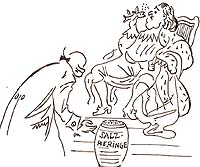 the mob beat everything to
bits, the chapel and also
the interieur of the embassy. The governing Council and the police
refrained from intervening. When the incident was reported to the
Emperor some time later he demanded that a high profile delegation of
the Council were to bend their knees in front of his throne. If this
did not occur in due time Imperial troups would occupy Hamburg and take
the culprits to court. Garlieb Sillem travelled to see Emperor
Karl VIin
Vienna, accompanied by a councillor and two parish elders. Also
dispatched from Hamburg: a barrel of herrings and champagne for the
Majesties. The Emperor and the Empress are said to have remarked later
graciously that it had been the first herrings they had had that year. the mob beat everything to
bits, the chapel and also
the interieur of the embassy. The governing Council and the police
refrained from intervening. When the incident was reported to the
Emperor some time later he demanded that a high profile delegation of
the Council were to bend their knees in front of his throne. If this
did not occur in due time Imperial troups would occupy Hamburg and take
the culprits to court. Garlieb Sillem travelled to see Emperor
Karl VIin
Vienna, accompanied by a councillor and two parish elders. Also
dispatched from Hamburg: a barrel of herrings and champagne for the
Majesties. The Emperor and the Empress are said to have remarked later
graciously that it had been the first herrings they had had that year.Afterwards the Emperor is said to to have ordered to invite the Mayor to dine with him. The lackay who was supposed to deliver the invitation pointed subserviently to the fact that His Majesty did not accept an untitled person at his table. Whereupon the Emperor said: "Make him a peer then!" However Garlieb regretted and brought to the Emperor's attention that as a citizen of Hamburg he was not in the position to accept a peerage as that would not be compatible with a centuries-old unwritten law. Replied the Emperor: "Make him a peer just for the evening then!" The Mayor is said to have subserviently accepted the invitation then. The kneeling down, the herrings, and the amount of the fine appeased the monarch. The negotiations had taken a full three months. Only then the delegation could return home. |
|
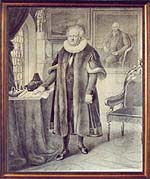 Mayor Martin Garlieb Sillem 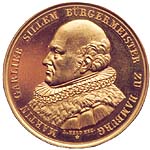 Commemorative coin for the Mayor |
Martin Garlieb Sillem visiting Napoleon One
of mayor Garlieb Sillem's grandsons
proved to be a
gifted merchant and skilled politician. His name: Martin
Garlieb Sillem (1769-1835).
He
entered the renowned merchant
firm of Johannes
Schuback
(1732-1817)
as an apprentice and as the years passed by eventually became a
business partner of the senior owner. His cousin, Jerôme
Sillem (1768-1833), already as a nineteen year old headed
the
equally important firm Matthiessen & Sillem, the reason being
that
his father who suffered from gout was no longer able to do this job.
Jerôme and Martin
Garlieb were friends. In 1810, Napoleon's armies occupied the cities of
Hamburg, Lübeck, Bremen, and Lüneburg. The Emperor
annexed
the newly created Departement to the French motherland and made Hamburg
the regional capital. He had already banned English vessels from
entering continental ports by proclaiming the continental blockade. As
a consequence, import and export businesses collapsed. Many merchants
went broke. The Council governments were deposed. Instead, the new
masters exploited the local population, robbed the businesses of their
cash and confiscated the silver reserve of the Hamburg bank. In
agreement with their partners, Martin
Garlieb and Jerôme closed
down their businesses in an attempt to rescue their possessions.
Jerôme transferred his capital stock to St. Petersburg where
he
worked as a financial advisor to the Russian Tsar's court and acted as
a representative for a British-Dutch merchant firm. The name was Hope
& Co, Amsterdam. Martin Garlieb became head of the Chamber of
Commerce that the French had established in Hamburg und led a
delegation of experts on a tour to Dresden where he asked Napoleon to
return the confiscated treasure, however in vain. He was arrested
temporarily. In 1814 the allied armies defeated the French at Waterloo.
The Emperor was exiled and the occupied countries and cities were
liberated. So was the Free and Hanseatic City of Hamburg. Presently,
Martin Garlieb travelled to Paris to demand repayment to his city. The
result was far from satisfactory. The costs of Napoleon's wars had
nearly bancrupted the French estate. Soon after Martin Garlieb was
appointed councillor in the new city government. The business of
Johannes Schiback began to flourish again. The senior owner had retired
and instead brought his grandson Johannes
Amsinck
(1792-1879) into the company. Martin Garlieb headed the merchant
enterprise until he became appointed as mayor. Then the Junior took
over. Martin Garlieb had become married only at 56. He died without
heirs. His nephew, Hans
Wolder
Sillem, Doctor of Laws and of Medicine, (1796-1835)
did not produce descendants either and died at only 39 years of age.
Thus Jacob's
branch of
the family became extinct.
|
|
| |
||
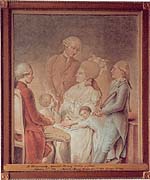 |
Fascinating to this day Regrettably, when talking
about family history ladies appear as a rule only as "appendages" to
their husbands who are the ones to take centrestage. The traditional
trinity of Kids - Kitchen - Church (Kinder - Küche - Kirche in German) about sums it up here. But there have been exceptions. One of them was Marie Louise Sillem,
née Matthiessen (1749-1826). Her father was the head of a
leading merchant house in Hamburg, and her mother belonged to two
Huguenot families that had migrated from France not long before.
Marie Louise's husband was Garlieb Helwig Sillem,
son of a Hamburg Councillor. His father-in-law made him a partner in
his business. His bride was 21 years his junior. She was charming,
sophisticated, focussed on everyday matters and in later life involved
in charity.
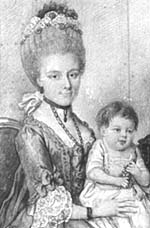 She developed into a charismatic personality, in high esteem with everybody and loved by many. Marie
Louise gave birth to as many as 17 children. Only nine of them lived to
grow up. But she coped surprisingly well with the near continuous life
in childbed and the loss of so many children. Certainly, her
unshattered faith in God's Allmight was of help. She developed into a charismatic personality, in high esteem with everybody and loved by many. Marie
Louise gave birth to as many as 17 children. Only nine of them lived to
grow up. But she coped surprisingly well with the near continuous life
in childbed and the loss of so many children. Certainly, her
unshattered faith in God's Allmight was of help. Garlieb Helwig was able
to provide his dear love with a life in affluence. There were helpful
servants at hand, such as the chamber maid, the coachman and the
gardeners, and of course the domestic staff. The city home
had annexes for offices and storage facilities and was situated in
the vicinity of the harbour. There was a large hall for the private
concerts Marie Louise loved to arrange. Händel's oratorios
were a favourite - the great composer lived in London at the time. The
English texts used to be translated by Louise Reichardt, a well-known
singer of lieder and close friend of the hostess.
"... in my last letter I directed his (her son Jean's) attention to
his father's ever-exhausting workload and the hardworking diligence of
all the employees in the Contoir that borders on slavery ..."
As her father had died years before and her husband had suffered from
debilitating gout pain for a long time, their son Jerôme had
to take over as director of the internationally connected
business at the age of 19. Every year his
mother spent many months in her most beautiful country estate and
received, together with sons and daughters, in-laws and grandchildren,
friends from home and abroad. A friend of Goethe's wrote to the Lord of
the Letters once the following:
"... having just arrived in Amsterdam I find myself at the table beside a Mr Sillem (Jerôme)
and recognise him as the son of the most venerable and wealthy widow in
Hamburg whose affection I was lucky to enjoy during my stay there
because I felt immensely drawn to her ..."
Insights into her noble-mindedness and her generosity can be gained
from her correspondence that has been preserved. Her letters have
been published in the book Die Sillems in Hamburg. |
|
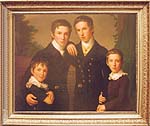 The sons Adolph, Wilhelm, Carl and Ernst |
A great banker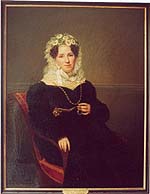 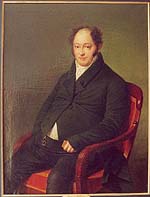 Wilhelmine Sillem and Jerôme Sillem Jerôme Sillem was a member of Heyn's branch of the family. News about the collapse of Napoleon's empire reached him probably in St. Petersburg where he lived with his wife Wilhelmine and five daughters. His four sons he had left in the care of his brother-in-law and sister-in-law living in Hamburg. At the same time he received a most attractive offer: the major shareholder of the banking company Hope & Co offered him to take over one third of the company's capital and also to become its director. Jerôme accepted and moved to Amsterdam with his family. Thanks to his dedication and his financial genius he established the company as a major player among the top European banks, well respected among his peers. In Hamburg he founded the company Sillem & Co for two of his sons, and invested both of them with a sum of 1,000 000 Bancomark each which stock exchange professionals considered to be an extraordinary sum at the time. His son Carl (1802-1876) who was to become the progenitor of all the Sillems living in Germany was not the best suited for the banking business - he would have preferred to become an agriculturist. His brother Wilhelm (1804-1885) who had been an apprentice at Hope & Co showed more skills in business but developed into a reckless speculator. His "showpiece" was to grant the Polish government a credit of dizzying height: pre-financing the year's harvest. The Polish used the money to finance a campaign against Russia. The Tsar's empire prevailed and Sillem & Co went bankrupt. Father Jerôme was devastated, and not only because of the financial loss. After all, he had been the Tsar's court banker! Jerôme did not live long after that. His son Ernst (1807-1861) became his successor at Hope & Co. He and his wife Henriette, a daughter of the mayor of Riga, became the founders of the Dutch branch of the Sillem family. There are more Sillems living in the Netherlands now than in Germany. |
|
A creative speculator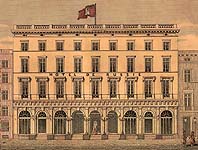 Wilhelm Sillem did not learn from the disaster he had caused. To the contrary: he continued to hope for profits from speculations. First he moved to London with his large family where he found employment in the firm run by his uncle Hermann Sillem (1788-1849). Hermann was one of Jerôme's younger brothers. He and his wife who was from Kassel in Hessia are the founders of the English branch of the Sillem family. Wilhelm endured only two years in London. After that he tried his luck in Mexico. However, his business partners over there soon withdrew confidence after failed speculations. After four more years he returned to Hamburg as a failed entrepreneur. Backed by his well-to-do mother, he started with two new projects. In a side alley in the city he built 17 houses for wealthy people. Nine years later he had sold only 9 of them. His brother Adolph Sillem (1811-1884) took over the remaining ones and put them on the market. Then Wilhelm had Germany's first glass-covered shopping passage and a hotel built on Hamburg's splendid boulevard Jungfernstieg. The public response to "Sillem's Bazar" was enthusiastic at first. However due to inconsiderate errors of judgment on Wilhelm's side the wealthy clientèle began to stay away after some time. Already after 40 years the hotel and the passage were pulled down and replaced by new buildings. Both projects had failed. The family had lost lots of money. They stripped the speculator of his legal capacity. He was granted a fixed annual sum and urged to leave the city. With his wife and children Wilhelm moved to Geneva and spent the remainder of his life there. He got deeply involved in public welfare caring for the poor and shared what was left of his fortune with the needy in the city. They called him "Father of the Poor", and a street was named after him. His son Wilhelm Sillem (1842-1904) became an agriculturist. He migrated to Argentina with his family. He and his wife who was from Switzerland were the founders of the Argentinian branch of the Sillem family. |
||
These are
excerpts from a Family Chronicle
titled
„Die Sillems in Hamburg“. It is written in German
by Hans-Wolff Sillem
who lives in Hamburg. It has 260 pages and a wealth of pictures.
The chronicle can be purchased from the author. Write to sillemhw@t-online.de. |
||
| |
||
|
Click
on
pictures to enlarge!
|
||
 |
   |

